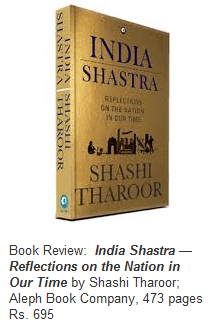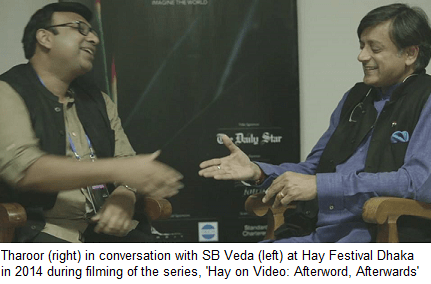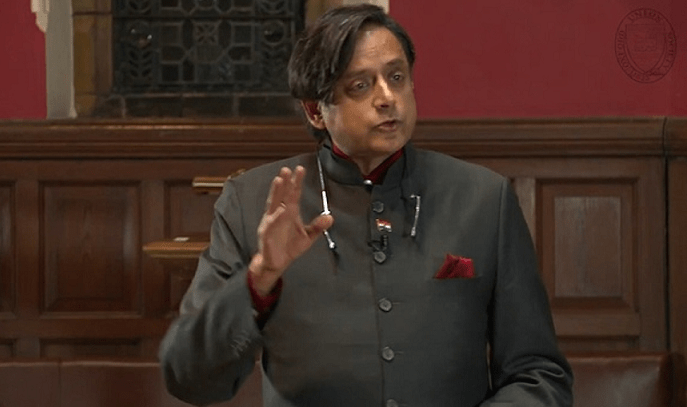India Shastra: Witty Expositions From a Serious Intellect
By SB Veda
 Grand, paradoxical, vibrant, dirty, mystical, beautiful, diverse – these along with an array of other qualifiers only begin to capture India’s complexity. Few writers and intellectuals can navigate her depth and breadth the way Shashi Tharoor can and does in his latest book, India Shastra: Reflections on the Nation in Our time. In terms of casting contemporary polity against a storied past, he is perhaps unmatched. The last in a non-fiction trilogy, his latest offering showcases his knowledge, talent and characteristic wit on various issues relevant to India, both domestic and international.
Grand, paradoxical, vibrant, dirty, mystical, beautiful, diverse – these along with an array of other qualifiers only begin to capture India’s complexity. Few writers and intellectuals can navigate her depth and breadth the way Shashi Tharoor can and does in his latest book, India Shastra: Reflections on the Nation in Our time. In terms of casting contemporary polity against a storied past, he is perhaps unmatched. The last in a non-fiction trilogy, his latest offering showcases his knowledge, talent and characteristic wit on various issues relevant to India, both domestic and international.
A cricket fan, he bats up a century of expositions most of which were published as stand-alone articles but are grouped together according to theme. Refreshingly, most are free of the sport of Politics save for the first two chapters in which the appearance partisanship (rather than the fact of it) might well turn off some readers. The antidote is to read on, for there is much more to this book than mere politics.
Critiquing the first six months of the new Modi administration Tharoor suggests that Modi’s India is fundamentally un-Indian. As viewed by her founding fathers – a lens that is both a secular and socialist – the analysis is quite apt. Modi’s India is defined by her Hindu past with economic policies that seem to derive from Adam Smith, and embedded at its core is the notion of the state at the centre of public life. In fairness, the ‘Hindu’ India envisioned by many of Modi’s supporters is pluralistic, the religion by its very nature being accepting of other faiths. But, as in the case of other communities, the tolerant are often shouted down by the zealots, who are emboldened under a leader known for Hindu chauvinism. Tharoor refers to the change, post-2014 using the pun, ‘Modi-fied.’ He doesn’t end with a mere play on words: he elucidates in great detail the rationale – all of which is logical and clearly put. Where he could have gone further is in explaining how the predecessor government (led by his own party) contributed to a climate that would elect such an ‘un-Indian’ Prime Minister. He has more recently reflected on his own party in a more discerning manner.
It’s not all criticisms, though. Early in the book, he lauds, Modi’s cleanliness initiative (of which he is a part) and Sushma Swaraj’s progress in Afghanistan. Tharoor has a public record of expressing support for initiatives he feels are positive demonstrating more so than his peers, a cool mult-partisanship. Some have felt he has been too kind to the BJP. His essays are far from a collection of plaudits: he calls out the Prime Minister in the strongest terms for failing to speak up against those in his party who have exhibited all that is ugly and intolerant about the Hindutva movement.
Tharoor has a spirited time with some of crackpots in the saffron tent, and they provide much fodder. An essay on then Health minister Harsh Vardhan’s campaign against sex education is a case in point. In this, it is worth recalling that no party has no monopoly on eccentricity. The father of the nation, no less, slept with his grand-nieces nightly to put his vow of celibacy to the test; and staunch Gandhian, former Prime Minister Morarji Desai famously drank his own urine apparently to enhance his vigour. The more important question is whether such ‘weirdness’ is potentially dangerous. The former Health Minister’s campaign against condoms and other kinds of sex education certainly qualifies as well as being antithetic to the very office he held. It is telling that Modi, ever the efficient administrator, replaced him with JP Nadda, and now India has signed an international agreement that prioritizes universal access to sexual and reproductive healthcare services, including family planning.
Other than Modi, Tharoor’s essays focus on various historical icons. From differences between Gandhi and Tagore to expositions invoking to Tilak and Vivekananda – to Jawaharlal Nehru whom Tharoor calls the architect of modern India, Tharoor reminds us of the shoulders we stand upon. For all his criticisms of the current government, his most stinging words are left for the British whom he chastises with characteristic wit: ” “No wonder the sun never set on the British Empire: even God couldn’t trust the Englishman in the dark!”
The essays roam far and wide, covering much territory. One of the more prescient issues he tackles is language: “The new government’s requirement that Hindi be privileged actually works against the interests of efficiency,” he writes. He cites the episode of Mulayam Singh Yadav, as defence minister, writing to West Bengal Chief Minister Jyoti Basu in Hindi who then replied in Bengali. “Language,” he writes, “should be an instrument of opportunity not of oppression.” In this, Tharoor makes a strong statement – but the question of how the current movement differs from the Nehruvian drive to ‘Hindify’ India remains unanswered. In this, is Modi not building on a foundation built by Nehru?
 As Tharoor , digs up paths tread upon by others, he demonstrates his originality of thinking perhaps most compellingly, in two chapters: ‘The Pursuit of Excellence’ and ‘India in Flux’. In the latter, he chronicles India’s quest to excel in various key areas of development, be it industry and manufacturing or a better quality of education. He writes of the impetus behind India’s lunar mission Chandrayaan and the mission to Mars, Mangalyaan. These initiatives have been much ridiculed abroad. Even Amartya Sen has questioned the wisdom of a space program for a country with serious public sanitation issues. Tharoor makes the case for these initiatives in their serving to inspire (much as the lunar program did for the USA in the ’60s); he does so eloquently. Of course, he cannot ignore twitter (how could he?) as well as discussing e-governance and the role of the internet in shaping the future polity and socio-political space.
As Tharoor , digs up paths tread upon by others, he demonstrates his originality of thinking perhaps most compellingly, in two chapters: ‘The Pursuit of Excellence’ and ‘India in Flux’. In the latter, he chronicles India’s quest to excel in various key areas of development, be it industry and manufacturing or a better quality of education. He writes of the impetus behind India’s lunar mission Chandrayaan and the mission to Mars, Mangalyaan. These initiatives have been much ridiculed abroad. Even Amartya Sen has questioned the wisdom of a space program for a country with serious public sanitation issues. Tharoor makes the case for these initiatives in their serving to inspire (much as the lunar program did for the USA in the ’60s); he does so eloquently. Of course, he cannot ignore twitter (how could he?) as well as discussing e-governance and the role of the internet in shaping the future polity and socio-political space.
Where Tharoor’s analysis is at its zenith is in describing India as a society in flux. He remarks on a nation in which astrology and numerology are juxtaposed with science and technology. He writes of colonial dress codes that have survived empire. He describes how the caste system continues to plague in the towns beyond the cities and rural India. And, he points out the challenges faced in safeguarding women, protecting their rights and realizing their aspirations in a society plagued by entrenched patriarchy.
While the issues mentioned above have been explored extensively by others, in taking them on, Tharoor demonstrates his distinct policy-making acumen. A case in point would be his discussion of the declining female numbers in the national sex ratio. Here he elucidates what he calls positive and negative policy making (incentives vs. punitive laws) to bring about results: ” ..in a democracy like India’s, it’s hard to tell people what they can’t do or to enforce legislation that tries to do that. The positive approach focuses on incentives. How about tax breaks for mixed -caste marriages? Gants for having female children? If girls are undervalued because they don’t earn as much as men, countervailing policies can be made. Since our growing economy unduly favours men, there is a role for government to help create employment opportunities for women.”
Someone in his position might be tempted to rail upon the ignorant masses, and espouse draconian punishments. But despite his elite pedigree, he understands the common man (and woman) and knows that India has an enforcement problem. He tackles the whole of the issue and explains how policy can help motivate as well as discourage behavior. He does the same thing with terrorism, narrating the story of a nation undaunted by violence while he raises the issues that speak to the roots of this unrest In this, he demonstrates his legislative wisdom, leaving one to one wonder why he wasn’t the Prime Ministerial candidate for his party in the last election. The result might have been different!
In the last chapter, India Beyond India, he gives us some insight into his thinking around foreign policy and discusses global issues of relevance to the country. He begins with an essay on his UN experience, and in it one gets a glimpse (a mere glimpse but a telling one) into the depth and breadth of his experience in international affairs. In being exposed to his thinking on the UN, one realizes that he has ruminated on big global issues more so than most all of his peers in both houses of government. And he has been involved in implementing solutions during periods of global conflict and acute crisis.
He understands how nations interact and how nations ought to interact, espousing a concept called ‘responsible sovereignty’, writing of “the notion that nations must cooperate across borders to safeguard common resources and to tackle common threats. I think that’s a very sensible and succinct way of looking at the world which we have come to , over six decades after the institutions of global governance were created, in a very different world , and in itself in a reaction to a very different world that preceded it.”
Interestingly, he suggests that the World Bank and IMF are becoming increasingly obsolete in a world where emerging powers have come to the forefront and fewer countries are marginalized, the flow of capital moving from west to east: “we cannot fail to note the increase in the number of major powers across the world since the structures of the international system were put in place in 1945. It is an undeniable fact that the emerging powers have moved very much from the periphery to the centre of global discourse and global responsibility, and they have now a legitimate and an increasingly voluble desire to share power and responsibility in the global system. The dominance of a handful of small industrialized Western countries, especially in the international financial institutions (the so called Bretton Woods organizations), looks increasingly anomlalous in a world where economic dynamism has shifted irresistibly from the west to the east.”
It is perhaps not surprising that Tharoor is against the idea of a ‘League of Democracies,’ the notion that such a forum of democratically elected nations might prove to be more effective in responding to humanitarian crises, sharing ostensibly a common set of liberal values than the body of the UN where every nation is a member. He argues that democracies don’t necessarily get along, citing the “prickly” relationship between France and India, and that such a forum might simply be a way for the Anglo-American alliance to run roughshod over the UN. He advocates reinvourating the UN rather than establishing an alternative forum.
Interestingly, in the next essay, Tharoor opines that in a world of growing multi-alliances, the Nehruvian Non-Aligned Movement has lost its relevance, and that India should continue to engage in as many forms as possible in various international fora and partnerships. This, on the surface, appears to be at odds with his UN-centric view but one must keep in mind the context of each essay. The former is a reaction to the 2008 presidential race in which the validity of the UN was questioned and the latter has a more historical context. Herein lies the difficulty of reading, side-by-side, a collection of essays not necessarily written with thematic purpose at the time of composition.
So, in Tharoor’s reflections, if one actually expects a ‘shastra’ (as the title suggests), in other words, a rule or treatise written to explain in detail a thought or an idea, one may well be left wanting. He has not organized his essays around a central thesis or in the service of a particular agenda. But that should not be considered a flaw. The book should be read as a collection of essays, reflecting his insight and positions on various issues of relevance to Indians. When one is tired of reading the newspaper and in need of thought-provoking exposition, cogent analysis, and unrivaled wit, one should pick this book up. And, do not rush! The essays are best consumed like a fine wine, sipping slowly over a period of time.
Whether one agrees with Tharoor’s analysis and solutions or not, in finishing this book, one is cannot help but be astonished at the agility of the author’s intellect both in sharpness of insight and breadth of coverage. In the end, if one is inclined to ask the big questions, consider the author’s ideas and ruminate on them, the book has done its job – and then some. For so few books on current events call upon the reader to think deeply, seek answers, and become part of a larger public discourse. It is fitting, therefore, to conclude with Tharoor’s great questions while imploring all to read India Shastra: Reflections on the Nation in Our Time – and leave it to readers to consider a response:
What does the future hold? Is the promise of good times a mere illusion? Have we forgotten the democratic, humane, secular and liberal values that our founding fathers endowed us with? Are high-speed trains and missions to Mars eclipsing the vital need to achieve universal literacy, eradicate poverty, and provide food, shelter and health-care for all?
 The Global Calcuttan Magazine
The Global Calcuttan Magazine 